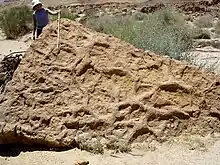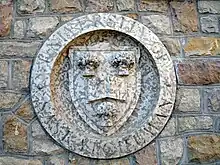Thalassinoides
Thalassinoides is an ichnogenus of trace fossil used to refer to "dichotomously or T-branched boxworks, mazes and shafts, unlined and unornamented".[1]: 179 Facies of Thalassinoides increased suddenly in abundance at the beginning of the Mesozoic.[1]: 251 Such burrows are made by a number of organisms, including the sea anemone Cerianthus, Balanoglossus and fishes, but are most closely associated with decapod crustaceans of the (former) infraorder Thalassinidea.[2]
| Thalassinoides | |
|---|---|
 | |
| Thalassinoides, burrows produced by thalassinideans, from the Middle Jurassic, Makhtesh Qatan, southern Israel | |
| Trace fossil classification | |
| Ichnogenus: | †Thalassinoides Ehrenberg, 1944 |
Gallery
 Thalassinoides burrow system in the Sherborne Building Stone (Jurassic, Bajocian) of Dorset, England; slab cut parallel to bedding.
Thalassinoides burrow system in the Sherborne Building Stone (Jurassic, Bajocian) of Dorset, England; slab cut parallel to bedding. Thalassinoides burrow system in the Sherborne Building Stone (Jurassic, Bajocian) of Dorset, England; slab cut perpendicular to bedding.
Thalassinoides burrow system in the Sherborne Building Stone (Jurassic, Bajocian) of Dorset, England; slab cut perpendicular to bedding. Thalassinoides burrows give a unique texture to this crest carved from Ordovician Tyndall limestone.
Thalassinoides burrows give a unique texture to this crest carved from Ordovician Tyndall limestone.
References
- Richard Granville Bromley (1996). Trace Fossils: Biology, Taphonomy and Applications (2nd ed.). Routledge. ISBN 978-0-412-61480-4.
- Paul M. Myrow (1995). "Thalassinoides and the enigma of Early Paleozoic open-framework burrow systems". PALAIOS. 10 (1): 58–74. Bibcode:1995Palai..10...58M. doi:10.2307/3515007. JSTOR 3515007.
This article is issued from Wikipedia. The text is licensed under Creative Commons - Attribution - Sharealike. Additional terms may apply for the media files.